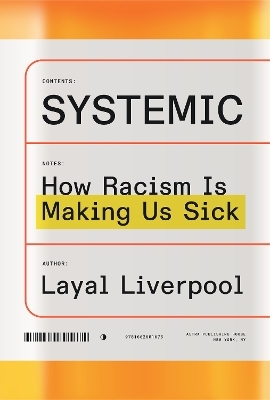
Systemic
How Racism Is Making Us Sick
Seiten
2025
Minedition (imprint of Penguin Group (USA) Inc) (Verlag)
978-1-6626-0310-5 (ISBN)
Minedition (imprint of Penguin Group (USA) Inc) (Verlag)
978-1-6626-0310-5 (ISBN)
- Noch nicht erschienen (ca. Juni 2025)
- Portofrei ab CHF 40
- Auch auf Rechnung
- Artikel merken
In the spirit of Medical Apartheid and Killing the Black Body; A science-based, data-driven, and global exploration of racial disparities in health care access by virologist, immunologist, and science journalist Layal Liverpool.
Layal Liverpool spent years as a teen bouncing from doctor to doctor, each one failing to diagnose her dermatological complaint. Just when she’d grown used to the idea that she had an extremely rare and untreatable skin condition, one dermatologist, after a quick exam, told her that she had a classic (and common) case of eczema and explained that it often appears differently on darker skin. Her experience stuck with her, making her wonder whether other medical conditions might be going undiagnosed in darker-skinned people and whether racism could, in fact, make people sick.
The pandemic taught us that diseases like Covid disproportionately affect people of color. Here, Liverpool goes a step further to show that this disparity exists for all types of illness and that it is caused by racism. In Systemic, Liverpool shares her journey to show how racism, woven into our societies, as well as into the structures of medicine and science, is harmful to our health. Refuting the false belief that there are biological differences between races, Liverpool goes on to show that racism-related stress and trauma can however, lead to biological changes that make people of color more vulnerable to illness, debunking the myth of illness as the great equalizer.
From the problem of racial bias in medicine where the default human subject is white, to the dangerous health consequences of systemic racism, from the physical and psychological effects of daily microaggressions to intergenerational trauma and data gaps, Liverpool reveals the fatal stereotypes that keep people of color undiagnosed, untreated, and unsafe, and tells us what we can do about it.
Layal Liverpool spent years as a teen bouncing from doctor to doctor, each one failing to diagnose her dermatological complaint. Just when she’d grown used to the idea that she had an extremely rare and untreatable skin condition, one dermatologist, after a quick exam, told her that she had a classic (and common) case of eczema and explained that it often appears differently on darker skin. Her experience stuck with her, making her wonder whether other medical conditions might be going undiagnosed in darker-skinned people and whether racism could, in fact, make people sick.
The pandemic taught us that diseases like Covid disproportionately affect people of color. Here, Liverpool goes a step further to show that this disparity exists for all types of illness and that it is caused by racism. In Systemic, Liverpool shares her journey to show how racism, woven into our societies, as well as into the structures of medicine and science, is harmful to our health. Refuting the false belief that there are biological differences between races, Liverpool goes on to show that racism-related stress and trauma can however, lead to biological changes that make people of color more vulnerable to illness, debunking the myth of illness as the great equalizer.
From the problem of racial bias in medicine where the default human subject is white, to the dangerous health consequences of systemic racism, from the physical and psychological effects of daily microaggressions to intergenerational trauma and data gaps, Liverpool reveals the fatal stereotypes that keep people of color undiagnosed, untreated, and unsafe, and tells us what we can do about it.
Layal Liverpool is a science journalist with expertise in biomedical science, particularly virology and immunology. Her PhD research at Oxford focused on investigating how invading viruses are detected by the body’s immune system. Her writing has appeared in Nature, New Scientist, Wired, and the Guardian. Currently, she is a journalist at Nature.
| Erscheint lt. Verlag | 17.6.2025 |
|---|---|
| Sprache | englisch |
| Maße | 152 x 229 mm |
| Gewicht | 369 g |
| Themenwelt | Studium ► 1. Studienabschnitt (Vorklinik) ► Anatomie / Neuroanatomie |
| Studium ► 1. Studienabschnitt (Vorklinik) ► Physiologie | |
| Naturwissenschaften ► Biologie ► Humanbiologie | |
| ISBN-10 | 1-6626-0310-X / 166260310X |
| ISBN-13 | 978-1-6626-0310-5 / 9781662603105 |
| Zustand | Neuware |
| Haben Sie eine Frage zum Produkt? |
Mehr entdecken
aus dem Bereich
aus dem Bereich
Buch | Hardcover (2022)
Urban & Fischer in Elsevier (Verlag)
CHF 307,95
Struktur und Funktion
Buch | Softcover (2021)
Urban & Fischer in Elsevier (Verlag)
CHF 61,60
+ Web + Lehrbuch
Buch | Hardcover (2022)
Urban & Fischer in Elsevier (Verlag)
CHF 348,55


